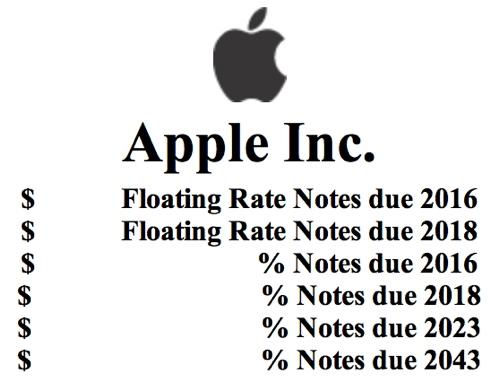A year after it turned to the bond markets to fund its capital repurchase program, Apple is planning to do the same yet again, with a sale price that would reportedly be the second highest in corporate history.
Apple has another massive $17 billion bond sale in the works that would target both the U.S. and foreign markets, according to the Financial Times. That cash will help the company increase its share buyback efforts, which were announced last week to be surging to $90 billion through the end of 2015.
Apple Corporate Comptroller Luca Maestri said last week that his company would likely raise "an amount of term debt financing similar to what we used in 2013." It was last April that Apple announced a six-part $17 billion bond offering that at the time was the largest in corporate history.
That bond sale has since been surpassed by Verizon's sale of $49 billion bonds in 2013. But if Apple were to exceed its sum from last year, it would rank as the second-highest bond sale in history.
Apple has taken on debt to help fund its share buyback program, allowing it to keep a strong domestic cash position without repatriating (and paying high taxes) on overseas money.
Though Apple has some $150 billion in cash, almost all of that — $130 billion — Â is held overseas. Executives from the company have signaled numerous times, including last week, that they have no plans to repatriate the overseas cash, citing high tax rates for bringing the money to the U.S.
Apple would not only need to buy back shares with domestic cash, but company executives also plainly stated that they would like to stay with a liquid cash position to allow flexibility for options like research and development investments, as well as acquisitions.
For its foreign debt sale, Apple is likely to target the eurozone for low interest rates, according to the Times. This would allow the company to diversify its base, and also help prevent saturation of the U.S. debt market with such a large sale.
 Neil Hughes
Neil Hughes







-m.jpg)






 Wesley Hilliard
Wesley Hilliard
 Malcolm Owen
Malcolm Owen
 Andrew Orr
Andrew Orr
 William Gallagher
William Gallagher
 Sponsored Content
Sponsored Content
 Christine McKee
Christine McKee

 Thomas Sibilly
Thomas Sibilly







33 Comments
So, if Apple sold it's debt in the "eurozone" could it bring those funds back to the US for share buybacks and dividends (since it isn't foreign profits) but then pay back the debts with funds already held in the "eurozone?" If that was legal it seems like a pretty easy way to get around repatriation tax requirements. I'm guessing that must not be kosher, but I don't understand why not.
Simple fact is the 30 % repatriation rate is stupid.. other countries have it at under 10%.. even Canada is under 10% now.. We COMPETE against these countries for this cash flow.. Yet, our politicians are basically telling our American companies that they should do international business and to keep the cash made away from the US market. Stupid.. both sides of the isle need to be kicked to the curb..
Greg in Prague: I don't think that will work. I'm not an accountant, etc but the debt and the eurozone cash are held by different legal entities.
"Both sides?" Is that right? Be a pal and show me where i can research the GOPs efforts to levy massive corporate taxes. In fact, show me where i can learn about any GOP effort to levy massive taxes, and in return I'll show you the unicorn photos i took in malibu last week. "Both sides..." You'd be better off just blaming the "gubbermint" than trying to ascribe some blame for DNC policy on "both sides" like some partisan sycophant. One party is renowned for their willingness to tax the snot out of the working class to fund the purchase of the votes from the non working class, and it isnt "both sides".
greginprague I was thinking the same thing nut willliamh may be right. I'm sure this will be discussed more in future articles. In answer to the other set of comments, it is quite clear that no politician in the US is willing to sacrifice their political career over tax reform. The special interests and lobby groups would ensure that the candidate would have no chance of getting re-elected since they would lose all their funding.